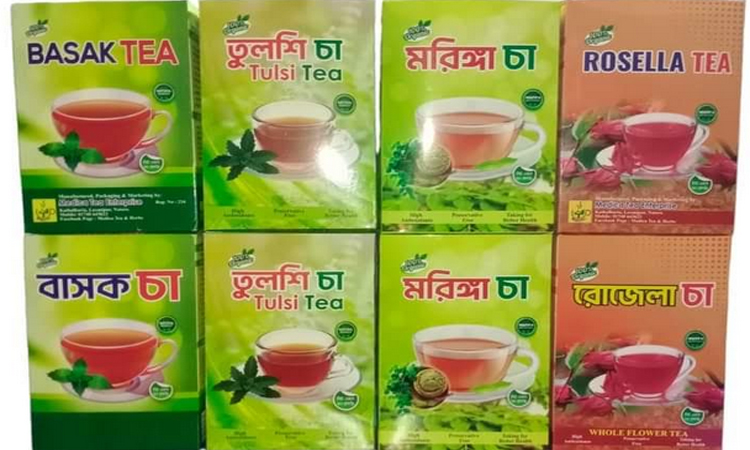News Flash

NATORE, Nov 21, 2025 (BSS) - Colorful teas, including red and blue varieties derived from the extract of beautiful flowers, are experiencing rising demand due to their notable medicinal properties.
This innovative success story is credited to Md Shahidul Islam, an exemplary medicinal producer and processor based in Natore's Laxmipur-Kholabaria area, known as the country's only medicinal village.
Md. Shahidul Islam, who also serves as the President of the Kholabaria Hajiganj Bazaar Medicinal Production and Marketing Cooperative Society, previously cultivated traditional medicinal plants like Aloe Vera, Simul, Ashwagandha, and Shatamul on his land.
Beyond cultivation, he is also recognized for innovating the drip irrigation method.
In 2017, he began cultivating the Roselle plant after collecting saplings from the Rangpur Jute Research Institute. Tea produced from the Roselle flower, which is characteristically red in color, is now appreciated nationwide.
Shahidul is considered a pioneer in Roselle tea production within the country. Initially cultivating Roselle tea on only five decimals of land in 2017, the cultivated area has now expanded significantly to ten bighas.
Following his lead, many others in the Medicinal Village are now cultivating Roselle.
Roselle saplings are typically planted in June. The harvesting of the flower calyx begins in November and continues through December into January. Approximately 1,500 plants can be row-planted per bigha of land.
After processing, one bigha of cultivated Roselle flowers yields 100 kg of tea. Generally, one kilogram of fresh flowers yields 20 grams of processed dry flower.
The Roselle flower calyx is renowned for its medicinal qualities. Research conducted by various journals highlights its extensive health benefits including lowering high blood pressure, controlling cholesterol, protecting the liver, protecting cells as an antioxidant and controlling blood sugar.
When prepared, 50 grams of the processed Roselle flowers can produce 24 cups of blood-red, slightly sour tea. Commercially, one kilogram of loose Roselle tea is priced at Taka 1,500, while the packaged version costs Taka 2,500.
Shahidul Islam has further diversified his production by cultivating the attractive Aparajita shrub on the edge of his cultivated land in Kanthaibaria. The Aparajita flowers, which bloom continuously, peaking during the rainy season, are processed into highly attractive, blue-colored Aparajita tea.
In just six months, he successfully produced four kilograms of processed Aparajita flower tea. The blue tea is noted for having a slightly bitter, earthy taste. Its current selling price is Taka 4,000 per kg. A 50-gram packet of Aparajita flower tea can be used to prepare 100 cups of tea.
According to Ayurvedic scriptures, Aparajita flower extract is beneficial for heart disease as it reduces levels of triglycerides, cholesterol, and LDL in the blood. The flower's components, including saponins and flavonoids, play a role in preventing asthma.
Furthermore, anthocyanins prevent cancer by inhibiting free radical formation, while polyphenols and flavonoids help protect the liver by reducing liver enzyme levels.
Md. Shahidul Islam operates his processing and sales center for various teas at Kanthaibaria Bazaar. The processed Roselle flower, marketed as a hot beverage under the name Medica Tea Enterprise, is tested by BCSIR and approved by BSTI.
He primarily markets Roselle tea nationwide through online channels, and also sells saplings produced from seed. Similarly, Aparajita flowers are processed into Aparajita tea. Other products include black-colored Basak tea derived from Basak leaves and greenish Tulsi tea derived from Tulsi leaves.
Shahidul Islam, an exemplary medicinal plant producer, expressed his desire to expand the scope of production and marketing for all his beneficial hot beverages-Roselle tea, Aparajita tea, Basak tea, and Tulsi tea-with the goal of popularizing them among the general public.
Md. Habibullah Khan, Deputy Director of the Department of Agricultural Extension (Natore District Office), praised Shahidul Islam's unique diversification and development, expressing his expectation that Shahidul will continue to advance through his innovative work.